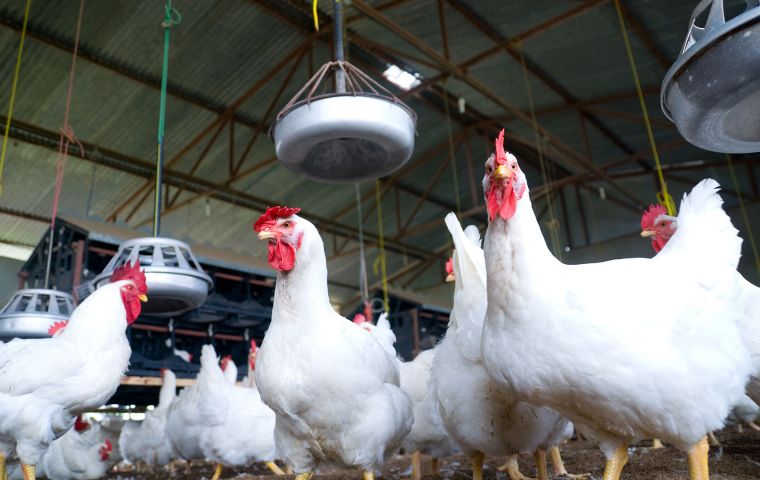MercoPress. South Atlantic News Agency
Chile reports first human case of avian influenza; Uruguay begins vaccination in commercial poultry farms
 Uruguay agriculture minister Fernando Mattos announced the start of mandatory vaccination on May 2nd of all laying hens in commercial farms
Uruguay agriculture minister Fernando Mattos announced the start of mandatory vaccination on May 2nd of all laying hens in commercial farms The Ministry of Health of Chile notified WHO of the detection of human infection with avian influenza A(H5) virus. The patient is a 53-year-old male from the Region of Antofagasta in the north of Chile. He had no history of comorbidities or recent travel.
Meanwhile in Uruguay veterinary authorities announced that beginning May 2nd it will begin the vaccination of laying hens in commercial units. This follows the detection of ten outbreaks among wild birds.
On 7 April 2023, the Chile International Health Regulations National Focal Point reported the results of genomic sequencing completed on 5 April 2023 by the NIC, which identified avian influenza A(H5N1) phylogenetic clade 2.3.4.4b.
On 13 March 2023, the patient developed symptoms including cough, sore throat, and hoarseness. On 21 March, due to worsening symptoms, he sought care at a local hospital. On 22 March 2023, the patient developed dyspnea and was admitted to a Regional Hospital at Antofagasta (SARI Sentinel Site). A nasopharyngeal swab sample was collected as part of routine severe acute respiratory infection (SARI) surveillance and tested negative for SARS-CoV-2 by reverse transcription-polymerase chain reaction (RT-PCR). On 23 March, the patient was admitted to the intensive care unit and treatment with antivirals (oseltamivir) and antibiotics was initiated. The patient remains in respiratory isolation under multidisciplinary management, with mechanical ventilation due to pneumonia. Standard infection control precautions were kept since the detection of the case.
On 27 March, a bronchoalveolar sample was collected and tested positive for an unsubtypeable influenza A virus by PCR. The sample was sent to the ISP and tested positive for avian influenza A(H5) on 29 March. On 31 March, the NIC forwarded the patient's samples to a WHO Collaborating Centre for further characterization.
On 5 April, the results of genomic sequencing were completed by the NIC in Chile, which identified avian influenza virus A(H5N1) phylogenetic clade 2.3.4.4b. The genomic sequencing had 99.9% identity with H5 hemagglutinin sequences from Chilean birds, and complete neuraminidase (NA) had 100% identity with N1 sequences from Chilean birds.
Three close contacts of the case were identified, all asymptomatic, tested negative for influenza and have concluded the monitoring period. Additionally, a total of nine contacts among healthcare workers were identified, all tested negative for influenza and concluded the monitoring period on 4 April. However, on 5 April one of them developed respiratory symptoms, therefore a nasopharyngeal swab was taken, which tested negative for influenza; the monitoring period for this contact was extended for seven additional days, ending on 11 April.
Avian influenza A (H5N1) was first detected in the Region of the Americas in birds in December 2014. Between December 2022 and February 2023, highly pathogenic avian influenza (HPAI) has been detected in wild aquatic birds (pelicans and penguins) and sea mammals (sea lions) in the Antofagasta Region where the case resides. According to preliminary findings of the epidemiological investigation of this human case, the most plausible route of transmission was through environmental exposure, given the large number of dead sea mammals and wild birds found in the area close to the patient´s residence.
This week Uruguayan agriculture, livestock and fisheries minister Fernando Mattos announced that will begin mandatory vaccination of all laying hens in commercial farms. This happens after ten outbreaks of avian influenza among wild birds in conservation areas.
Mattos said that Uruguay had purchased ten million doses of vaccines to for shots against one day chicks and adult hens laying eggs. Vaccines are from Mexico and the million vaccination will last some twenty days.
The minister also warned that poultry farms must reinforce their bio-security because “vaccination is not the magic formula or the only measure to combat the pandemic”. He added that the ministerial services will keep track of the avian influenza epidemic to assess if a new doses is needed or other categories in commercial farms will also have to be inoculated.
Mattos finally said that avian influenza has extended to the whole planet, repeated that there is no danger or transmission for humans who consume eggs or chicken meat, and vaccination is becoming the instrument to control the epidemic.




Top Comments
Disclaimer & comment rulesCommenting for this story is now closed.
If you have a Facebook account, become a fan and comment on our Facebook Page!